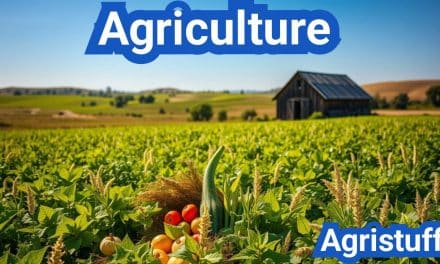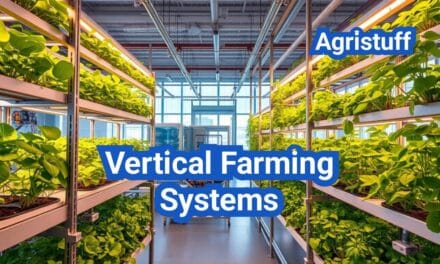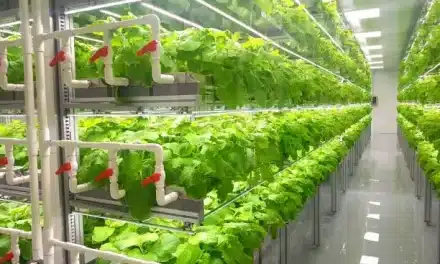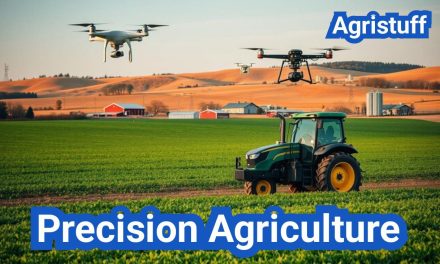Agri business is a vital sector that encompasses farming and farming-related commerce, including the production, processing, and distribution of farm-based goods. It plays a significant role in the economy, providing employment opportunities and contributing to the country’s GDP.
The importance of agri business cannot be overstated, as it ensures food security and stimulates economic growth. Various aspects of agribusiness, such as agriculture business degrees, agribusiness management, and agricultural financing, are crucial for its success.
Key Takeaways
- Agri business is a significant sector that contributes to the economy.
- It encompasses farming and farming-related commerce.
- Agribusiness management is crucial for its success.
- Agricultural financing is essential for the growth of agribusiness.
- Agri business meaning is closely related to its role in ensuring food security.
What Is Agri Business: Definition and Scope
Agri business, a term that has gained significant traction, encompasses a broad range of activities beyond traditional farming. It involves the integration of agricultural practices with business principles to create profitable ventures. The scope of agri business is vast, covering everything from the production and processing of agricultural products to their distribution and marketing.
The Meaning and Concept of Agri Business
The concept of agri business is multifaceted, combining the traditional aspects of farming with modern business techniques. It includes not just the cultivation of crops and rearing of livestock but also the application of technology and management practices to enhance efficiency and profitability. Agri business is about creating value-added products and services that meet the demands of a growing global population.
The agri business sector has become increasingly important as it addresses critical issues such as food security, sustainability, and economic development. By adopting innovative practices and technologies, agri businesses can improve productivity while minimizing environmental impact.
The Evolution of Agribusiness Through History
The evolution of agribusiness has been marked by significant advancements in technology and changes in consumer demand. Historically, farming was primarily focused on subsistence, with any surplus being sold locally. However, with the advent of industrialization and globalization, farming practices began to shift towards more commercial and large-scale operations.
The Green Revolution of the 1960s was a pivotal moment in the evolution of agribusiness, introducing high-yielding crop varieties and modern farming techniques that significantly increased food production. Since then, the sector has continued to evolve, incorporating new technologies such as precision agriculture, biotechnology, and vertical farming.
Difference Between Traditional Farming and Modern Agribusiness
Traditional farming is characterized by its focus on producing food for local consumption, often using methods passed down through generations. In contrast, modern agribusiness is driven by market demands and profit motives, utilizing advanced technologies and management practices to maximize efficiency and output.
One of the key differences between traditional farming and modern agribusiness is the scale of operation. Modern agribusiness often involves large-scale production and distribution networks, whereas traditional farming is typically smaller in scale. Additionally, modern agribusiness places a strong emphasis on sustainability and environmental stewardship, adopting practices that reduce waste and minimize environmental impact.
By understanding the differences between traditional farming and modern agribusiness, we can better appreciate the complexities of the agricultural economy and the role that agri business plays in meeting global food demands.
The Importance of Agribusiness in Today’s Economy

The economic importance of agribusiness is evident in its far-reaching impacts on employment, food security, and economic development. As a significant sector, agribusiness contributes to the overall health of the economy by providing goods and services that are essential for daily life.
Economic Impact of the Agricultural Sector
Agribusiness has a substantial economic impact, generating revenue and creating jobs both directly and indirectly. According to the United States Department of Agriculture (USDA), the agricultural sector contributes significantly to the national GDP. In 2022, the total value added by the agricultural sector was approximately $1.054 trillion.
Agricultural Sector’s Contribution to GDP
| Year | GDP Contribution ($ Billion) | Percentage of Total GDP |
|---|---|---|
| 2020 | 1,046.8 | 5.2% |
| 2021 | 1,021.9 | 4.9% |
| 2022 | 1,054.0 | 5.0% |
Food Security and Global Agricultural Production
Agribusiness plays a critical role in ensuring food security globally. By producing and distributing food products, agribusiness helps meet the world’s nutritional needs. As the global population continues to grow, the importance of agribusiness in maintaining food security becomes increasingly evident.
“The world’s agricultural production is projected to increase by 1.3% annually from 2020 to 2030, driven by productivity gains and technological advancements.” –
FAO
This growth in agricultural production is crucial for meeting the food demands of a rising global population, projected to reach 9.7 billion by 2050.
Employment Generation in Agribusiness
Agribusiness is a significant source of employment, both in rural and urban areas. From farming and production to processing and distribution, agribusiness creates a wide range of job opportunities. In the United States alone, the agricultural sector employs millions of people, contributing to local and national economies.
- Direct employment in farming and agricultural production
- Indirect employment in agricultural support services and input supply businesses
- Employment in food processing and distribution companies
In conclusion, agribusiness is vital to the economy, providing essential goods and services, ensuring food security, and generating employment opportunities. Its impact is felt across various sectors, making it a cornerstone of economic stability and growth.
Key Components of the Agribusiness System
Understanding the agribusiness system requires examining its key components, which include input supply businesses, production farming enterprises, processing and distribution companies, and agricultural support services. These elements work together to create a comprehensive food supply chain that meets the demands of a growing global population.
Input Supply Businesses
Input supply businesses are the foundation of the agribusiness system, providing essential goods and services to farmers. These inputs include seeds, fertilizers, pesticides, and equipment, without which agricultural production would be significantly hampered. Companies that specialize in these inputs play a crucial role in ensuring that farmers have access to high-quality products that can improve crop yields and reduce losses due to pests and diseases.
Production Farming Enterprises
Production farming enterprises are at the heart of the agribusiness system, responsible for growing crops and raising livestock. These enterprises range from small, family-owned farms to large, commercial operations. They utilize the inputs provided by supply businesses to produce raw agricultural products, which are then processed and distributed to consumers.
Processing and Distribution Companies
Processing and distribution companies take the raw products from farms and transform them into consumable goods. This involves various processes, including cleaning, packaging, and labeling, to ensure that products are safe and appealing to consumers. Distribution networks then transport these products to retailers, who ultimately sell them to consumers.
Agricultural Support Services
Agricultural support services are vital to the smooth operation of the agribusiness system. These services include financial institutions, insurance providers, and advisory services that help farmers and other agribusiness stakeholders manage risks and improve their operations. For example, financial institutions provide loans to farmers to purchase inputs, while insurance providers offer policies that protect against crop failures and livestock diseases.
Types of Agribusinesses in Today’s Economy
The agribusiness sector is diverse, encompassing various types of enterprises that contribute to the agricultural economy. This diversity is crucial for meeting the global demand for food, fiber, and other agricultural products.
Large-Scale Agricultural Corporations
Large-scale agricultural corporations play a significant role in the global agricultural landscape. These corporations are characterized by their extensive resources, advanced technology, and large workforce. They are involved in various aspects of agriculture, from production to distribution, and often have a significant impact on local and global markets.
Key characteristics of large-scale agricultural corporations include their ability to invest in cutting-edge technology, manage vast tracts of land, and negotiate global supply chains. Examples include companies involved in massive crop production, livestock farming, and agricultural product processing.
Small and Medium Agricultural Enterprises
Small and medium agricultural enterprises (SMAEs) are vital components of the agricultural economy, particularly in rural areas. These businesses are often family-owned or locally operated and contribute significantly to local food systems and community development.
SMAEs are known for their agility and adaptability, allowing them to respond quickly to market changes and consumer demands. They may specialize in niche products, organic farming, or direct-to-consumer sales through farmers’ markets or community-supported agriculture (CSA) programs.
Innovative Agri-Tech Companies
Innovative agri-tech companies are transforming the agricultural sector through technology and innovation. These businesses develop and implement advanced solutions such as precision agriculture, drones, and data analytics to improve efficiency, productivity, and sustainability.
Agri-tech innovations include vertical farming, genetic engineering, and farm management software. These companies often collaborate with traditional farming operations to enhance their productivity and reduce environmental impact.
Sustainable Agriculture Ventures
Sustainable agriculture ventures focus on environmentally friendly practices, social responsibility, and economic viability. These businesses aim to produce food and other agricultural products while minimizing their ecological footprint and promoting biodiversity.
Sustainable practices in agriculture include organic farming, regenerative agriculture, and agroforestry. Sustainable agriculture ventures often engage in direct marketing to consumers, educating them about the benefits of sustainable farming practices and the value of their products.
5 Successful Agribusiness Examples

From crop production to food processing, there are many inspiring examples of thriving agribusinesses. These successful ventures not only contribute to the economy but also play a crucial role in ensuring food security and sustainability.
Crop Production Businesses
Crop production is a fundamental aspect of agribusiness, involving the cultivation of various crops for food, feed, and fiber. Successful crop production businesses often employ innovative farming techniques and technology to enhance yield and reduce environmental impact.
For instance, companies like John Deere have been at the forefront of precision agriculture, providing farmers with the tools and technology needed to optimize crop production. Similarly, Archer Daniels Midland (ADM) is a global leader in crop processing and production.
Livestock and Dairy Operations
Livestock and dairy operations are another critical component of the agribusiness sector, providing essential products such as meat, milk, and dairy products. Successful operations in this area focus on animal welfare, sustainable practices, and efficient production methods.
Companies like New Zealand’s Fonterra Cooperative Group are renowned for their dairy operations, while Tyson Foods is a leading player in the livestock sector. These businesses often invest heavily in research and development to improve productivity and reduce their environmental footprint.
Agricultural Input Suppliers
Agricultural input suppliers play a vital role in supporting farmers by providing essential inputs such as seeds, fertilizers, and equipment. Successful businesses in this category often focus on innovation and customer service.
Bayer CropScience and Monsanto (now part of Bayer) are prominent examples of agricultural input suppliers that have developed advanced seed technologies and crop protection solutions.
Food Processing Companies
Food processing is a crucial step in the agribusiness value chain, involving the transformation of raw agricultural products into consumable goods. Successful food processing companies prioritize quality, safety, and innovation.
| Company | Specialization | Notable Achievements |
|---|---|---|
| PepsiCo | Food and Beverage Processing | Leading brand portfolio, sustainable sourcing practices |
| Nestle | Dairy and Food Products | Innovative product development, commitment to quality |
| General Mills | Cereal and Food Processing | Diverse product range, focus on consumer health |
These companies demonstrate the diversity and innovation within the agribusiness sector, showcasing successful strategies across different areas.
How to Start Your Own Agri Business: Step-by-Step Guide
Embarking on an agri business journey requires careful planning and execution. To succeed in this complex industry, entrepreneurs must be well-prepared to tackle various challenges.
Step 1: Identify Your Niche in Agriculture
Identifying a niche is crucial for any agri business. It involves determining the specific area of agriculture you want to venture into, such as crop production, livestock farming, or agricultural technology.
- Crop production: Focus on growing specific crops, such as organic vegetables or grains.
- Livestock farming: Specialize in raising animals, like cattle or poultry.
- Agricultural technology: Develop or implement innovative farming solutions.
By focusing on a specific niche, you can tailor your business strategy to meet the unique demands of that area.
Step 2: Develop a Comprehensive Business Plan
A comprehensive business plan is essential for guiding your agri business towards success. It should include:
- Market analysis: Understand your target market and competition.
- Business model: Define how your business will operate and generate revenue.
- Marketing strategy: Outline how you will promote your products or services.
- Financial projections: Estimate your financial performance over a certain period.
A well-crafted business plan serves as a roadmap for your agri business, helping you navigate challenges and make informed decisions.
Step 3: Secure Financing for Your Venture
Securing adequate financing is vital for launching and growing your agri business. You can explore various financing options, such as:
- Traditional bank loans: Conventional financing methods.
- Grants and subsidies: Government programs or non-repayable funds.
- Investors: Seek out investors who are interested in agri business ventures.
- Crowdfunding: Raise funds from a large number of people, typically through online platforms.
It’s essential to choose the financing option that best suits your business needs and goals.
Step 4: Navigate Legal Requirements and Regulations
Understanding and complying with legal requirements and regulations is critical for the legitimacy and success of your agri business. This includes:
- Business registration: Register your business according to local laws.
- Licenses and permits: Obtain necessary licenses and permits to operate.
- Environmental regulations: Comply with regulations related to environmental protection.
- Employment laws: Adhere to laws governing employment practices.
By navigating these legal aspects effectively, you can avoid potential legal issues and ensure the smooth operation of your agri business.
Agricultural Entrepreneurship Opportunities

The rise of agricultural entrepreneurship is transforming the way we produce, process, and consume food. This shift is driven by innovative technologies, changing consumer preferences, and the need for sustainable practices.
Emerging Trends in Agri Startups
Agri startups are leveraging cutting-edge technologies such as AI, IoT, and biotechnology to revolutionize farming practices. These emerging trends include precision agriculture, vertical farming, and the use of drones for crop monitoring.
Key Trends:
- Precision agriculture for optimized crop yields
- Vertical farming for urban areas
- Use of drones for monitoring and management
From Farm to Market: Value Addition Strategies
Value addition is crucial for agricultural businesses to increase profitability. Strategies include processing raw produce into consumable products, enhancing quality through grading and packaging, and creating brand identities.
| Strategy | Description | Benefits |
|---|---|---|
| Processing | Converting raw produce into products | Increased shelf life, higher value |
| Quality Enhancement | Grading and packaging | Better marketability, premium pricing |
| Branding | Creating brand identity | Customer loyalty, market differentiation |
Niche Markets in Agriculture
Niche markets offer opportunities for agricultural entrepreneurs to specialize in unique or high-demand products. Examples include organic produce, exotic crops, and specialty livestock.
Examples of Niche Markets:
- Organic farming
- Exotic crop cultivation
- Specialty livestock breeding
Digital Platforms for Agricultural Business
Digital platforms are transforming agricultural businesses by providing market access, improving supply chain efficiency, and enabling data-driven decision-making.
Digital Platform Benefits:
- Market access and visibility
- Supply chain optimization
- Data-driven farming practices
Modern Farming Systems and Technologies

Modern farming systems, driven by technology and innovation, are transforming agricultural practices worldwide. These advancements are crucial in meeting the increasing global food demand while minimizing environmental impact.
Precision Agriculture Techniques
Precision agriculture involves the use of advanced technologies such as GPS, drones, and sensors to optimize crop yields and reduce waste. This approach allows farmers to make data-driven decisions, improving efficiency and productivity.
- GPS-guided farming equipment
- Drones for crop monitoring
- Soil sensors for moisture detection
Sustainable Farming Practices
Sustainable farming practices focus on maintaining soil health, conserving water, and reducing the use of chemical pesticides and fertilizers. These methods not only benefit the environment but also contribute to better crop quality and increased biodiversity.
Key sustainable practices include:
- Crop rotation and intercropping
- Organic farming
- Integrated pest management
Smart Farming and IoT Applications
Smart farming integrates Internet of Things (IoT) technology to enhance farming operations. IoT devices can monitor and control various aspects of farming, such as temperature, humidity, and soil conditions, in real-time.
Benefits of smart farming include:
- Improved crop monitoring
- Automated irrigation systems
- Enhanced livestock management
Biotechnology in Agriculture
Biotechnology plays a significant role in modern farming by developing genetically modified crops that are resistant to pests and diseases, and can thrive in challenging environmental conditions.
The use of biotechnology in agriculture has several advantages, including:
- Increased crop yields
- Improved nutritional content
- Reduced pesticide use
The Agriculture Supply Chain Explained

The journey of agricultural products from farm to table is facilitated by an intricate supply chain. This complex network involves multiple stages, from production to consumption, and is influenced by various factors including supply chain management practices and technology integration.
From Production to Consumption
The agriculture supply chain encompasses several key stages: input supply, production, processing, distribution, and consumption. Each stage plays a crucial role in ensuring that products reach the end consumer in a timely and efficient manner.
- Input supply involves providing farmers with necessary materials such as seeds, fertilizers, and equipment.
- Production is the farming stage where crops are grown or livestock is raised.
- Processing involves transforming raw agricultural products into consumable goods.
- Distribution ensures that products are delivered to retailers or consumers.
- Consumption is the final stage where products are consumed by end-users.
Supply Chain Management in Agribusiness
Effective supply chain management is critical in agribusiness for reducing costs, improving efficiency, and ensuring product quality. It involves coordinating and integrating the activities of various stakeholders, including farmers, suppliers, processors, and distributors.
According to a report by the Food and Agriculture Organization (FAO), “Efficient supply chain management can help reduce post-harvest losses and improve food security.”
“The way we manage our supply chains will be crucial in meeting the world’s growing food demands while minimizing environmental impact.”
| Stage | Key Activities | Challenges |
|---|---|---|
| Input Supply | Providing seeds, fertilizers, equipment | Quality control, timely delivery |
| Production | Farming, crop management, livestock rearing | Weather conditions, pests, diseases |
| Processing | Transforming raw products into consumable goods | Maintaining quality, safety standards |
Improving Efficiency in Agricultural Distribution
Improving distribution efficiency is vital for reducing costs and ensuring that products reach consumers in a fresh and timely manner. This can be achieved through better logistics management, use of technology, and infrastructure development.
Technology integration plays a significant role in enhancing distribution efficiency. The use of GPS tracking, data analytics, and mobile applications can help monitor and manage the movement of goods more effectively.
Technology Integration in Supply Chains
Technology is revolutionizing the agriculture supply chain by improving efficiency, reducing costs, and enhancing transparency. Innovations such as blockchain, IoT devices, and data analytics are being adopted to streamline supply chain operations.
For instance, blockchain technology can be used to track the origin and movement of products, ensuring authenticity and safety. IoT devices can monitor environmental conditions during transportation, ensuring that products are stored and transported under optimal conditions.
As the agriculture supply chain continues to evolve, the integration of technology will play a crucial role in shaping its future. By leveraging these innovations, stakeholders can improve efficiency, reduce waste, and meet the growing demands of consumers.
Major Challenges Facing Agribusiness Today

Agribusiness is navigating a challenging environment characterized by climate change, market fluctuations, and labor issues. The sector, which is crucial for global food security and economic stability, faces numerous obstacles that can impact its productivity and profitability.
Climate Change and Environmental Concerns
Climate change is one of the most significant challenges facing agribusiness today. Rising temperatures, changing precipitation patterns, and increased frequency of extreme weather events can lead to crop failures, reduced yields, and changed growing seasons. For instance, a study by the International Fund for Agricultural Development (IFAD) found that climate change could lead to a 2% annual decline in global agricultural productivity by 2030.
Market Volatility and Price Fluctuations
Market volatility is another major challenge for agribusinesses. Fluctuations in global commodity prices, trade policies, and exchange rates can significantly affect the profitability of agricultural enterprises. For example, the 2018 US-China trade tensions led to significant market volatility, impacting agricultural exports and prices.
| Factor | Impact on Agribusiness | Potential Mitigation Strategy |
|---|---|---|
| Climate Change | Reduced crop yields, changed growing seasons | Adoption of climate-resilient crops, precision agriculture |
| Market Volatility | Unpredictable prices, revenue fluctuations | Risk management tools, diversification of products |
| Labor Shortages | Increased labor costs, reduced productivity | Mechanization, training programs for workers |
Labor Shortages and Workforce Issues
Labor shortages and workforce issues pose significant challenges to agribusinesses, particularly in regions with aging populations or during peak harvest seasons. The sector often struggles to attract and retain workers due to physically demanding work conditions and relatively low wages compared to other industries.
Regulatory Compliance and Policy Changes
Agribusinesses must navigate complex regulatory environments, which can vary significantly across different countries and regions. Compliance with environmental regulations, labor laws, and food safety standards can be costly and time-consuming. Moreover, policy changes, such as those related to trade agreements or subsidies, can impact the competitiveness of agribusinesses.
To address these challenges, agribusinesses must adopt innovative strategies, invest in technology, and develop resilient business models. By understanding and mitigating these risks, the sector can continue to contribute to global food security and economic development.
Effective Agri Business Management Principles

To thrive in the competitive world of agribusiness, effective management principles are crucial. Agri business management involves a complex interplay of strategic planning, financial management, risk management, and marketing of agricultural products.
Strategic Planning for Agricultural Enterprises
Strategic planning is the foundation of successful agri business management. It involves setting clear goals, identifying resources, and outlining steps to achieve long-term objectives. A well-crafted business plan helps agricultural enterprises navigate challenges and capitalize on opportunities.
According to agricultural experts, “A good business plan is like a roadmap that guides the farm or agribusiness through the ups and downs of the market and weather conditions.” Effective strategic planning also involves staying abreast of market trends, technological advancements, and regulatory changes.
Financial Management in Agribusiness
Financial management is critical in agri business, where cash flow can be unpredictable due to factors like weather and market fluctuations. It involves budgeting, financial forecasting, and managing expenses to ensure profitability.
- Budgeting for operational costs and capital expenditures
- Managing cash flow to meet financial obligations
- Utilizing financial instruments like crop insurance
Risk Management Strategies
Agri businesses face various risks, from environmental factors to market volatility. Effective risk management strategies are essential to mitigate these risks. This includes diversifying crops or products, adopting climate-resilient practices, and using financial instruments like futures contracts.
“Risk management is not about avoiding risks but about understanding and managing them to achieve business objectives.” By proactively managing risks, agri businesses can enhance their resilience and stability.
Marketing Agricultural Products
Marketing is a crucial aspect of agri business management, involving the promotion and sale of agricultural products. Effective marketing strategies help agri businesses reach their target markets, differentiate their products, and achieve competitive advantage.
Successful marketing in agribusiness often involves understanding consumer preferences, leveraging digital marketing channels, and building strong brand identities. As the agricultural sector continues to evolve, adapting marketing strategies to changing consumer demands and market trends is vital.
Agri Financing Options and Strategies

Agri financing encompasses a range of strategies and options tailored to the agricultural industry’s needs. The agricultural sector is capital-intensive, requiring significant investments in equipment, technology, and labor. As such, accessing the right financing options is crucial for the success and sustainability of agri businesses.
Traditional Agricultural Loans and Grants
Traditional financing methods remain a cornerstone for many agri businesses. Bank loans and government grants are among the most common sources of funding. Banks offer various loan products with competitive interest rates, while government grants provide non-repayable funds to support specific agricultural projects or initiatives.
For instance, the United States Department of Agriculture (USDA) offers several loan programs, including direct farm ownership loans and guaranteed farm loans, to help farmers and ranchers purchase land, equipment, and other necessary resources.
| Loan Type | Description | Interest Rate |
|---|---|---|
| Direct Farm Ownership Loan | Assists farmers in purchasing land and other farm-related expenses. | 3.75% |
| Guaranteed Farm Loan | Provides guarantees to lenders, enabling farmers to secure loans. | 4.25% |
Alternative Financing Methods
Beyond traditional loans, alternative financing methods are gaining popularity in the agricultural sector. Crowdfunding and venture capital are innovative ways for agri businesses to secure funding. Crowdfunding platforms allow multiple individuals to invest small amounts in a project or business, while venture capital firms provide significant funding in exchange for equity.
“The rise of alternative financing options has democratized access to capital for agri businesses, enabling them to innovate and expand.”
John Doe, AgriBusiness Magazine
Risk Management and Insurance
Risk management is a critical aspect of agri financing. Agricultural businesses face numerous risks, including weather-related events, pests, and market fluctuations. Agricultural insurance helps mitigate these risks by providing financial protection against unforeseen events.
Various insurance products are available, including crop insurance, livestock insurance, and revenue insurance. These products help ensure that agri businesses can recover quickly from setbacks and maintain their financial stability.
Government Support Programs
Government support programs play a vital role in agri financing. These programs offer subsidies, tax incentives, and other forms of assistance to promote agricultural development. For example, the USDA’s Natural Resources Conservation Service (NRCS) provides financial assistance to farmers who implement conservation practices.
Additionally, government initiatives aimed at promoting sustainable agriculture and renewable energy can provide valuable funding opportunities for agri businesses.
Education and Career Paths in Agri Business

To thrive in the agri business sector, one must have a comprehensive understanding of both agricultural practices and business management, typically acquired through formal education. The agri business industry is multifaceted, requiring professionals who are well-versed in various aspects, from crop production to market dynamics.
Bachelor’s and Advanced Degrees in Agricultural Business
Educational pathways in agri business include bachelor’s and advanced degrees that focus on agricultural business management, economics, and related fields. These programs equip students with a solid foundation in business principles, agricultural practices, and market analysis.
Bachelor’s degree programs in agricultural business or related fields cover topics such as farm management, agricultural marketing, and agricultural economics. They often include hands-on experiences through internships or practical projects.
Advanced degrees, such as master’s or Ph.D.s in agribusiness or agricultural economics, offer specialized knowledge and qualify individuals for senior roles in management, research, or academia.
Key Skills Developed in Agribusiness Education
Agribusiness education develops a range of key skills that are crucial for success in the industry. These include analytical skills, business management skills, and a deep understanding of agricultural practices.
- Analytical skills to interpret market trends and agricultural data
- Business management skills to oversee operations and make strategic decisions
- Understanding of sustainable agricultural practices and their economic implications
Jobs in Agribusiness Management
Agribusiness management jobs are diverse, ranging from farm management to executive roles in agricultural companies. Professionals in these roles are responsible for strategic planning, financial management, and operational oversight.
Some common job titles include:
- Farm Manager
- Agricultural Business Manager
- Supply Chain Manager
Careers in Agricultural Production and Support Services
Careers in agricultural production involve hands-on work in farming, livestock management, and related areas. Support services include roles in agricultural consulting, input supply, and agricultural finance.
Examples of careers in this area include:
- Agricultural Consultant
- Farm Operations Manager
- Agricultural Input Sales Specialist
The Future of Agri Business
The future of agri business is poised for significant growth and transformation, driven by emerging trends and technological advancements. Sustainable agriculture practices are becoming increasingly important, as consumers demand more environmentally friendly products. Agricultural technology is also playing a crucial role, with innovations like precision farming and digital platforms enhancing efficiency and productivity.
Agribusiness trends indicate a shift towards more sustainable and technologically driven practices. The integration of agricultural technology is expected to continue, with advancements in areas like biotechnology and smart farming. As the global population grows, the demand for food is increasing, making agribusiness a vital sector for economic development and food security.
The outlook for agri business is promising, with opportunities for entrepreneurs and investors to capitalize on emerging trends. As the industry continues to evolve, it is essential for stakeholders to stay informed about the latest developments and best practices in sustainable agriculture and agricultural technology.
FAQ
What is agribusiness, and how does it differ from traditional farming?
Agribusiness encompasses the entire agricultural value chain, including production, processing, and distribution, whereas traditional farming focuses primarily on crop and livestock production.
What are the key components of the agribusiness system?
The key components of the agribusiness system include input supply businesses, production farming enterprises, processing and distribution companies, and agricultural support services.
How has technology impacted the development of agribusiness?
Technology has transformed agribusiness by increasing efficiency, improving crop yields, and enhancing supply chain management through precision agriculture, smart farming, and IoT applications.
What are the different types of agribusinesses, and what roles do they play?
Agribusinesses can be categorized into large-scale agricultural corporations, small and medium agricultural enterprises, innovative agri-tech companies, and sustainable agriculture ventures, each contributing to the agricultural economy in unique ways.
What are some successful examples of agribusinesses, and what makes them successful?
Successful agribusinesses include crop production businesses, livestock and dairy operations, agricultural input suppliers, and food processing companies, which achieve success through strategic planning, efficient operations, and effective marketing.
How can one start an agri business, and what are the key steps involved?
Starting an agri business involves identifying a niche, developing a comprehensive business plan, securing financing, and navigating legal requirements and regulations.
What are the emerging trends and opportunities in agricultural entrepreneurship?
Emerging trends in agricultural entrepreneurship include precision agriculture, sustainable farming practices, and digital platforms for agricultural business, offering opportunities for innovation and growth.
What are the major challenges facing agribusiness today, and how can they be addressed?
Agribusiness faces challenges such as climate change, market volatility, labor shortages, and regulatory compliance, which can be addressed through strategic planning, risk management, and investment in technology.
What are the effective management principles for agri businesses?
Effective agri business management involves strategic planning, financial management, risk management, and marketing strategies tailored to the agricultural sector.
What financing options are available to agri businesses, and how can they access capital?
Agri businesses can access capital through traditional agricultural loans and grants, alternative financing methods, risk management and insurance, and government support programs.
What educational pathways are available for those interested in pursuing a career in agri business?
Educational pathways in agri business include bachelor’s and advanced degrees in agricultural business, which develop key skills in business management, marketing, and agricultural production.
What career opportunities are available in the agricultural sector, and what skills are required?
Career opportunities in agribusiness include management roles, agricultural production, and support services, requiring skills in business management, marketing, and agricultural practices.
What is the future of agribusiness, and what trends will shape the sector?
The future of agribusiness will be shaped by technological advancements, sustainability concerns, and changing consumer preferences, driving innovation and growth in the sector.
Conclusion of: Agri Business
Agri business, also known as agribusiness, refers to the entire chain of activities involved in the production, processing, and distribution of agricultural products. Agri business plays a crucial role in food production and supply, encompassing a range of activities from farming and ranching to the marketing and selling of agricultural products.
What is Agri Business?
Agri business encompasses businesses that handle agricultural inputs and outputs, including farming activities, seed supply, fertilizer production, agricultural machinery, food processing, distribution, marketing, and retail sales. Essentially, it integrates multiple sectors to ensure food reaches consumers efficiently.
For more insights, visit USDA.gov.
Importance of Agri Business
Agri business significantly contributes to economic growth by creating employment opportunities, promoting rural development, and ensuring food security. With the global population steadily increasing, agri business addresses the critical need for sustainable food production and distribution systems.
Check out more details at FAO.org.
Types of Agri Business
Agri business includes diverse sectors such as:
- Farm Inputs: Production and supply of seeds, fertilizers, and pesticides.
- Farm Operations: Actual farming and livestock management.
- Processing: Conversion of raw agricultural products into consumable forms.
- Distribution and Retail: Transportation and selling of processed products to consumers.
Explore more at Agribusiness Global.
Role of Technology in Agri Business
Modern agri business increasingly incorporates technology to boost productivity and efficiency. Innovations like precision farming, automated machinery, and advanced biotechnology significantly enhance agricultural productivity and sustainability.
Discover innovations in agri tech at AgFunderNews.
Agri Business Management
Effective agri business management involves strategic planning, resource allocation, and understanding market dynamics. Managers in agri business must balance profitability with sustainability, regulatory compliance, and market competitiveness.
Detailed guidelines can be found at Harvard Business Review.
Challenges in Agri Business
Despite its potential, agri business faces numerous challenges such as climate change, fluctuating market prices, technological integration costs, and regulatory hurdles. Addressing these challenges requires innovative approaches and robust management practices.
Learn about challenges at World Economic Forum.
Opportunities in Agri Business
Emerging opportunities in agri business include organic farming, agro-tourism, agri-tech startups, and bio-fuels. These areas provide promising ventures for entrepreneurs looking to tap into growing consumer demands for sustainable and innovative agricultural products.
Find potential opportunities at IFC.org.
Sustainable Agri Business
Sustainability in agri business involves practices that protect the environment, ensure resource conservation, and promote economic viability. Sustainable practices include crop rotation, organic farming, integrated pest management, and water conservation techniques.
Explore sustainable agriculture at SARE.
Future of Agri Business
The future of agri business is set to embrace advanced technologies like AI, robotics, and blockchain, enhancing efficiency and transparency. Global cooperation, policy support, and investments will play crucial roles in shaping the industry’s growth trajectory.
For futuristic insights, visit McKinsey & Company.
Educational Pathways in Agri Business
Individuals interested in agri business can pursue degrees in agricultural science, agri business management, agricultural economics, or food science. These educational pathways provide essential knowledge and skills necessary to succeed in this industry.
Check out courses at Purdue University.
Agri Business and Economy
Agri business significantly impacts both local and global economies by generating employment, contributing to GDP, and facilitating international trade. Agri business sectors provide livelihoods to millions globally, influencing economic stability and growth.
Read more at World Bank.
Innovations in Agri Business
Innovative trends such as vertical farming, hydroponics, and gene editing are revolutionizing agri business. These advancements ensure increased productivity, reduced environmental impact, and enhanced food security.
Stay updated with innovations at MIT Technology Review.
Agri Business Marketing
Effective marketing strategies in agri business include branding, digital marketing, direct consumer marketing, and global market expansion. Robust marketing helps in product differentiation, increased sales, and sustained business growth.
Learn more about marketing strategies at American Marketing Association.
Financial Aspects of Agri Business
Agri business requires substantial financial management including investment planning, budgeting, risk management, and securing finance from banks or investors. Understanding financial intricacies helps agri business enterprises thrive.
Explore financial management at Investopedia.
Agri Business and Policy
Government policies significantly influence agri business through subsidies, regulations, trade agreements, and research funding. Understanding these policies is crucial for navigating the complex agricultural business environment.
Check the latest policies at Farm Bureau.
Final Thought
Agri business represents a critical component of the global economy, ensuring food production and sustainability. With innovative strategies and effective management, agri business can meet growing global food demands while maintaining environmental balance and economic viability.













